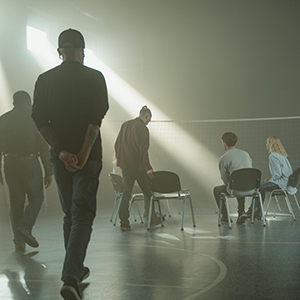Attachment insecurity predicts outcomes in an ACT-CBT group therapy for adults in a physical rehabilitation centre

Accepted: August 23, 2022
Appendix: 130
HTML: 34
All claims expressed in this article are solely those of the authors and do not necessarily represent those of their affiliated organizations, or those of the publisher, the editors and the reviewers. Any product that may be evaluated in this article or claim that may be made by its manufacturer is not guaranteed or endorsed by the publisher.
Authors
Adapting to chronic illness or disability is accompanied by acute and ongoing illness stressors. Psychological factors such as emotional distress and low self-efficacy are common experiences in chronic illness and disability and interfere with adaptation and psychosocial outcomes such as health-related quality of life. Transdiagnostic group psychotherapy may provide a parsimonious approach to psychological treatment in rehabilitation care by targeting shared illness stressors across mixed chronic illnesses and disabilities, and shared processes that maintain psychological symptoms. Attachment theory may explain individual differences in outcomes and help identify individuals at risk of poor health-related quality of life trajectories. Adults (N=109) participated in an 8-week process-based ACT-CBT psychotherapy group at a tertiary care physical rehabilitation centre between 2016 and 2020. Participants completed measures of emotional distress, self-efficacy, health-related quality of life, and attachment at pre- and post-treatment. Multilevel analyses indicated that patients improved on most outcomes at post-treatment. Attachment anxiety at pre-treatment was associated with more positive outcomes. Reliable change indices suggest clinically meaningful change for the majority of participants, but most were not recovered. Results provide proof-of-concept for the transdiagnostic group intervention and suggest that a longer course of treatment may be clinically indicated. Results warrant replication with larger and more diverse samples, and more robust designs.
How to Cite

This work is licensed under a Creative Commons Attribution-NonCommercial 4.0 International License.
PAGEPress has chosen to apply the Creative Commons Attribution NonCommercial 4.0 International License (CC BY-NC 4.0) to all manuscripts to be published.
Similar Articles
- Pedro Rodrigues Ribeiro, David Dias Neto, The real relationship: the Portuguese version of the Real Relationship Inventory-Client form , Research in Psychotherapy: Psychopathology, Process and Outcome: Vol. 26 No. 2 (2023)
- Marta Vigorelli, Gruppo di ricerca coordinato da Marta Vigorelli , Research in Psychotherapy: Psychopathology, Process and Outcome: Vol. 13 No. 2 (2010)
- Alessandro Talia, Svenja Taubner, Madeleine Miller-Bottome, Advances in research on attachment-related psychotherapy processes: seven teaching points for trainees and supervisors , Research in Psychotherapy: Psychopathology, Process and Outcome: Vol. 22 No. 3 (2019)
- Claudia Capella, Loreto Rodrìguez, Daniela Aguila, Denise Dussert, Ximena Lama, Carolina Gutierrez, Gretchen Beiza, Storied images of psychotherapeutic change: approaching children's voices through drawings , Research in Psychotherapy: Psychopathology, Process and Outcome: Vol. 18 No. 2 (2015): Special issue on Qualitative and Quantitative Research in Child and Adolescent Psychotherapy: part 1
- Giovanna Esposito, Ulrich Schultz-Venrath, Introduction , Research in Psychotherapy: Psychopathology, Process and Outcome: Vol. 25 No. 3 (2022): SPECIAL ISSUE: "Group psychotherapy: between settled benchmarks and new horizons"
- Alessia Renzi, Rachele Mariani, Michela Di Trani, Renata Tambelli, Giving words to emotions: the use of linguistic analysis to explore the role of alexithymia in an expressive writing intervention , Research in Psychotherapy: Psychopathology, Process and Outcome: Vol. 23 No. 2 (2020)
- Osmano Oasi, Simone Maggio, Sara Pacella, Sara Molgora, Dropout and narcissism: an exploratory research about situational factors and personality variables of the psychotherapist , Research in Psychotherapy: Psychopathology, Process and Outcome: Vol. 22 No. 2 (2019)
- Giorgio Caviglia, Raffaella Perrella, Walter Sapuppo, Nadia Del Villano, La ricerca in psicoterapia: il contributo del Gruppo di lavoro della Cattedra di Psicologia Dinamica (base) della Seconda Universitdi Napoli , Research in Psychotherapy: Psychopathology, Process and Outcome: Vol. 13 No. 2 (2010)
- Juliana Beatriz Stover, Alejandro Castro Solano, Mercedes Fernández Liporace, Dysfunctional personality traits: relationship with Five Factor Model, adaptation and symptomatology in a community sample from Buenos Aires , Research in Psychotherapy: Psychopathology, Process and Outcome: Vol. 22 No. 2 (2019)
- Francesco Gazzillo, Adriano Schimmenti, Ivan Formica, Alessandra Simonelli, Sergio Salvatore, Effectiveness is the gold standard of clinical research , Research in Psychotherapy: Psychopathology, Process and Outcome: Vol. 20 No. 2 (2017)
<< < 16 17 18 19 20 21 22 23 24 > >>
You may also start an advanced similarity search for this article.

 https://doi.org/10.4081/ripppo.2022.634
https://doi.org/10.4081/ripppo.2022.634




